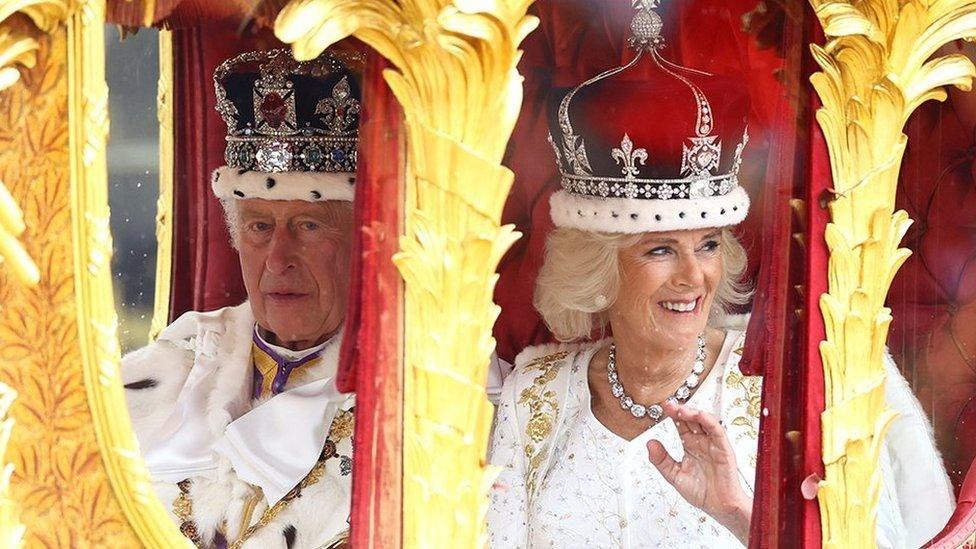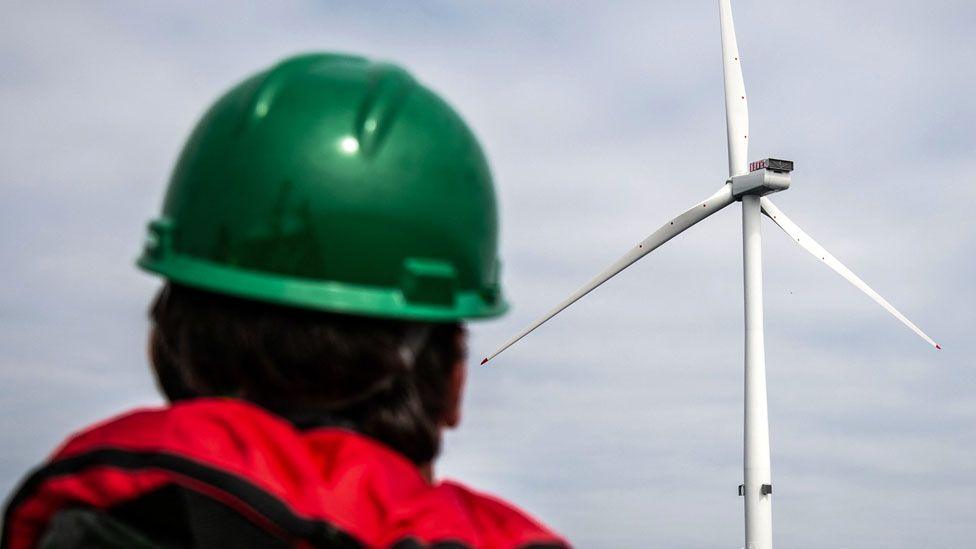Welsh ports in running for floating wind farms

Three locations in Wales have been proposed for new floating wind farms
- Published
Three Welsh ports have been shortlisted for contracts to develop offshore wind farm projects with turbines as high as skyscrapers in the Celtic Sea.
Swansea, Port Talbot and Milford Haven face rival bids from Bristol, Falmouth and Plymouth for the development of three new floating wind farms.
The turbines could be up to 300m (984ft) tall - almost as high as The Shard in London - and sit on a football pitch-sized platform.
The projects will be capable of generating enough renewable energy capacity to power more than four million homes, and would also create up to 5,000 jobs, the Crown Estate said.
Crown Estate powers 'risk' to jobs - Jo Stevens
- Published12 March
Wind farms 'unlikely' to halt red kites' recovery
- Published21 March 2024
Four times more wind power needed to hit net zero
- Published7 November 2023
It added the plans could give the economy a boost of as much as £1.4b.
Bidders proposing to develop the wind farms have set out which ports they want to work with to support the projects - including mounting the turbines on the floating platforms and towing them out to sea.
Among the three Welsh ports, bidding information showed "strong potential" for Port Talbot, the Crown Estate added.
The Port of Bristol could also play a key role, it said.
The successful bidder will be awarded rights for three new floating wind farms in the Celtic Sea, with winning bidders expected to sign agreements this summer.
The Crown Estate, which belongs to the King, owns 65% of the Welsh coast and riverbed and the seabed up to 12 miles out to sea.
Welsh secretary Jo Stevens said the announcement showed Wales was ready to seize the "golden opportunity of floating offshore wind in the Celtic Sea, and secure more than 5,000 jobs and billions of pounds of investment this has the potential to bring".
"Wales will play a key part in delivering clean power as part of our plan for change, boosting economic growth, lowering energy bills and putting more pounds in people's pockets," she added.
Plaid Cymru's energy spokesperson Llinos Medi MP said news that Welsh ports were in the running was "an exciting step forward".
But for Wales to fully benefit, profits from leasing the seabed needed to be reinvested back into Welsh communities by devolving the Crown Estate, she argued.
"Wales must have the power to manage and benefit from our own natural wealth," she said.
Analysis
by BBC Wales environment correspondent Steffan Messenger
After being talked about for years, these plans for a series of innovative floating windfarms are set to take a leap forward in the coming months.
Shortlisted firms will soon take part in an eBay style auction to bid for one of the three sites, with contracts signed over the summer.
Fast forward a few years and we could be getting used to seeing the enormous turbines being floated along the English Channel to their new homes out in the Celtic sea.
That effort brings with it huge potential for jobs and investment - but which communities will benefit?
Today we've heard that three Welsh ports are in the mix, with indications that Port Talbot is particularly favoured by some firms.
There is still a chance though that Wales misses out to ports in the south west of England or even Brest in France.
Calls for private and public funding to upgrade port infrastructure have been made repeatedly, to ensure Wales is as attractive as possible to developers.
The Crown Estate has been in the news a lot recently for other reasons too - with calls by some including the Labour-run Welsh government for it to be devolved, like in Scotland.
That would mean profits from its management of the seabed are retained in Wales rather than sent to the UK Treasury.
But opponents of that move - including the Labour-run Westminster government - cite the current windfarm proposals as a reason not to have such upheaval at the moment, arguing it could kill off Wales' hopes of attracting this investment.
- Published24 February

- Published25 July 2024

- Published2 November 2024
